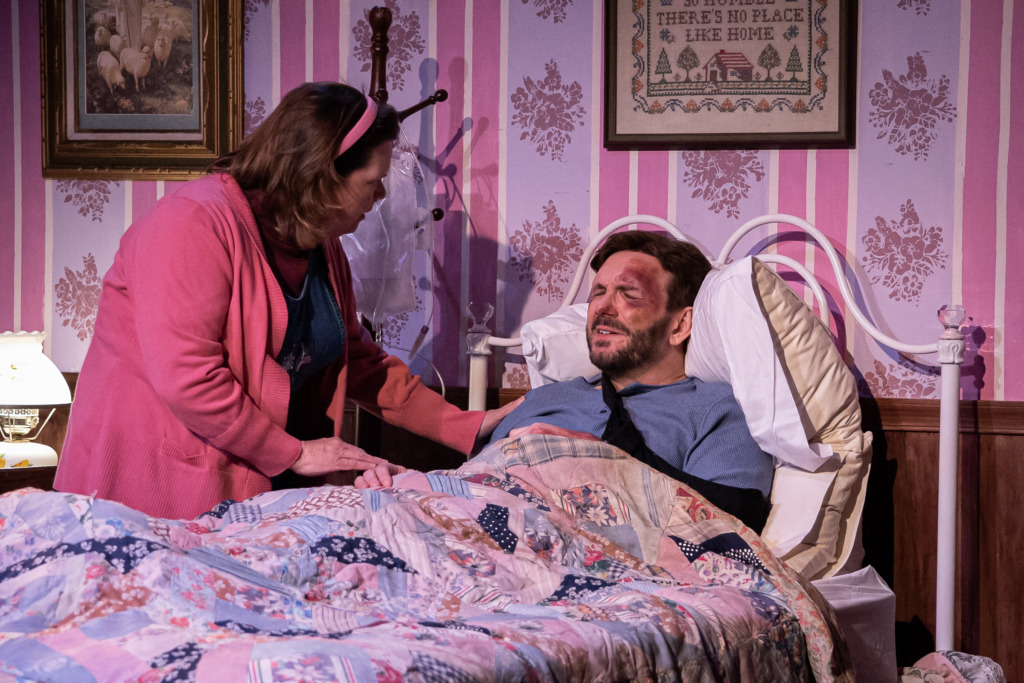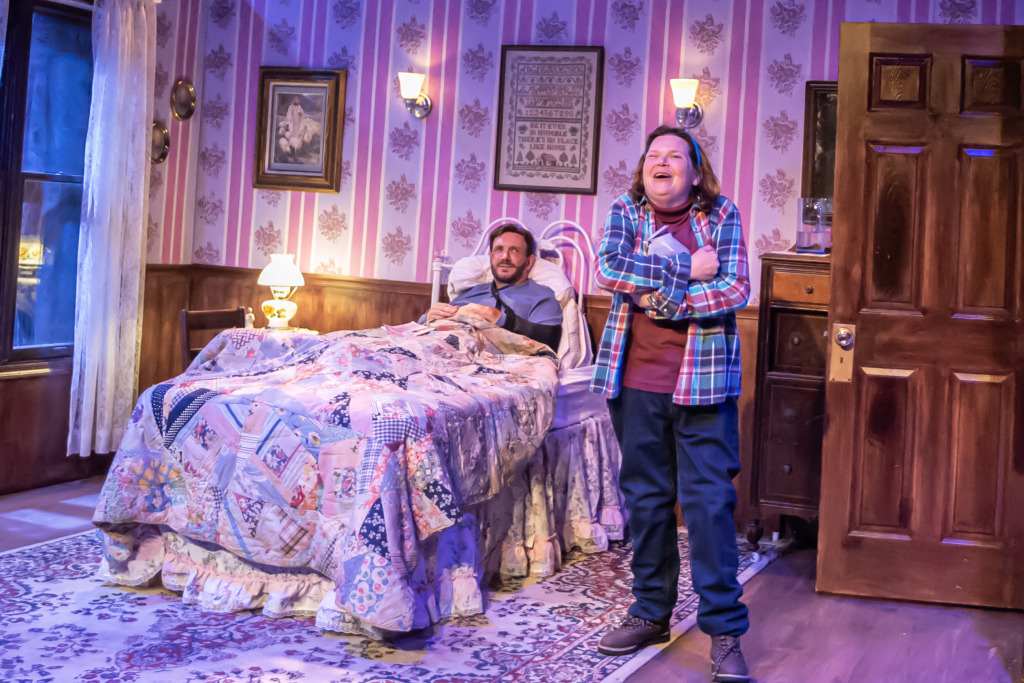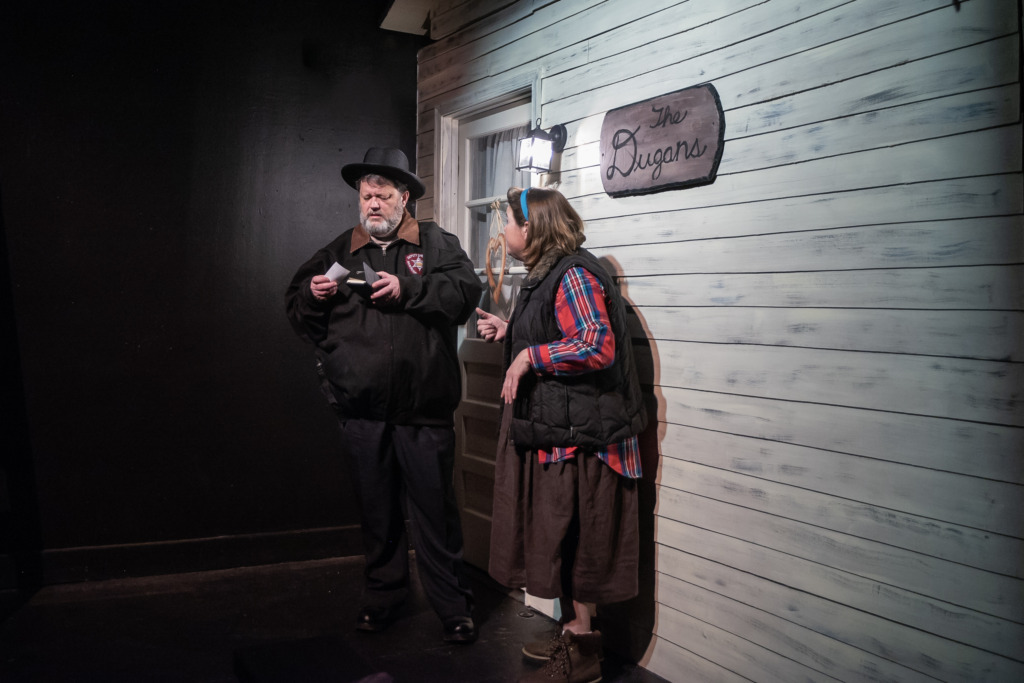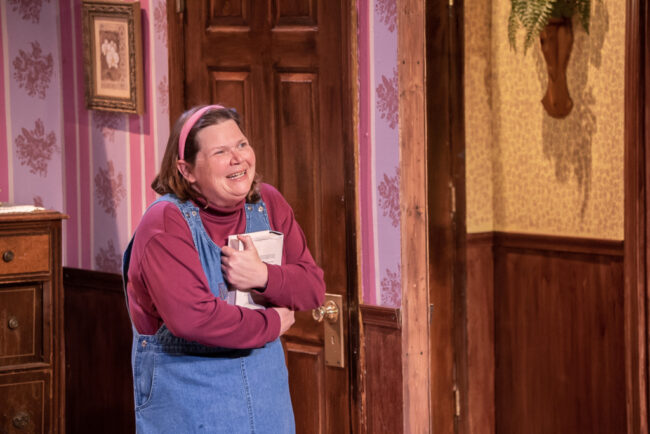You mustn’t cheat your readers. Ever. Or in this case, your theatergoers. Worry not, attendees of Other Voices Theatre, the current production of Misery won’t cheat you out of anything. This thrilling, edgy, and suspenseful drama— with the subtle flavoring of a dark comedy— may be a departure from the usual productions offered by the company but it’s a stellar performance that is brilliantly set down for an intense two hours’ stage traffic. Directed by Steve Cairns, this spine-tingling play, written by William Goldman and based on the Stephen King novel of the same name, is sure to bring you right to the edge of your seat.

When you first set eyes on the set, it’s impressive. The cross-sectional view of the home of Annie Wilkes— complete with foyer, kitchen, bedroom, and a tin-sided exterior. Scenic Designer Lee Hebb has fabricated a vision of creepy incarnate with this set, a great deal of which comes from the exacting detail. At first innocuous and even harmless, the set appears to be three very well-dressed rooms— any ordinary house interior. But upon closer inspection it’s all of the little things that make it a true house of horrors— stamped from not just a bygone era but a spot frozen in time, as if the inhabitant(s) simply aren’t ready to move forward with their lives. You get dark wood-paneled wainscotting, matching crown molding, and dated wallpaper creeping up the walls. The set is impressive to look at but Hebb’s genius lies in the ratio of rooms; the bedroom takes up a much larger portion of the space, which hones in the focus of Director Steve Cairns’ approach to the show— it’s Paul Sheldon’s experience; it’s Paul Sheldon’s point of view and the room where he spends most of his time is the bedroom so the bedroom is the largest room of the set. Everything from the retro furnishings (courtesy of Old Opera House) to the plethora of intricate props smattered over it (Properties Master Pat Dickinson) draws the audience into this intrinsic nightmare that Paul experiences. The lighting— designed by Stephen Knapp— is equal parts impressive, creating the illusion of not only deep night and early morning but the passage of time.
If there’s a minor complaint to be had with the show’s production design work its with Sean Hickey’s Sound Design or lack thereof in various short scene changes. I should make it clear that the scene changes are incredibly brief but they create a walloping dark silence which could be aided into a fully immersed theatrical experience with even just a hint of ominous music or something along those lines. Hickey does a fine job when utilizing sound— both at the very beginning when we get the eerie yet not fully discomforting sounds of the woods at night and later again during a lengthier scene change (where audio diversion is the perfect cover for an off-stage costume change.) But because of Hickey’s aptitude for sound utilization in other instances throughout the performance— like when the car engine hoofs to life and the car rumbles down the gravel drive (all of which is created in the minds of the audience solely by Hickey’s aural soundscape)— the absence of sound in those briefer scene changes is that much more noticeable. The terrifying effect of pure silence isn’t achieved in this instance, in the event that’s what Hickey was going for.

Maria Boyce and Nancy, the show’s costumers, have quite the knack for finding hideously wholesome and putridly “pure” fashions for the Annie Wilkes character. The couture is gently screaming Kathy Bates while simultaneously looking lively and vibrant, like much of the wallpaper on the set. In that vein, a nod of praise is owed to Jennifer Maschal-Lorms, the show’s “Special Effects Sorcerer”, who is responsible for the— well… several intrinsically violent moments that occur in Misery. Maschal-Lorms is particularly eviscerating in her approach to one of the more gruesome effects in particular.
The show, which on its own presents the challenge of being a series of strung-together vignettes, has a fervent pace with a natural build to its suspense and chaos. Director Steve Cairns delivers that pristine pacing admirably; the audience hardly notices when intermission falls upon them, nor that the show is completely wrapped up in almost exactly two hours’ time (including the intermission.) Cairns’ use of the space, and his generalized approach at blocking the spatial relationship between Annie and Paul adds to the dramatic tension that is ever-present and forever-building all throughout the performance.

With gravel and grit for a voice and words, Michael George lumbers the character of Buster— the local sheriff— on and off the stage with a bit of humor. The simplicity, as indicated by Buster’s text, is somewhat of a cliché but one that works well in the overall context of the script. And George does a fine job of finding little moments of awkward, but much-needed, humor and lets them land naturally for the audience. Of course George might just blow you away with his final moments on stage, but ultimately he’s well-suited for the cameo role.
Jeff Wine, as author Paul Sheldon, does a tremendous job of tackling the iconic role, made infamous by James Caan in the 1990 film. You get the sense that Wine is attempting to channel Stephen King directly and he does so with a great and mindful presence of where he is at all times. When Wine has to attempt to haul his character’s broken and severely injured body out of the bed and onto the floor, the scene is excruciating to watch— he’s that engaged. The panting, moaning, labored breathing, facial expressions, and overall agonizing body language during those moments are harrowing. When the Paul Sheldon character is in pain, Jeff Wine does such a sensational job of making it believable, it’s almost palpable. Moments of disorienting confusion grace Wine’s facial expressions with ease and his verbal exchanges with the Annie character come naturally enough (though the somewhat unplaceable accent is at times a tiny bit distracting.) Watching the struggle from beginning to end for Wine’s character is truly impressive and that final moment where he addresses the crowd— it’s beautifully brutal.

Whether you’ve seen Misery or not, read the book or not, from the moment you lay eyes on Annie Wilkes (Amy Hebb) there is an immediate sense of uneasiness. There’s just something— off. For those familiar with the story (be it from the original novel, the 1990 film, or the recent Broadway production), you get the immediate sense that Amy Hebb was the perfect choice from jump street. Hebb presents an initial saccharine veneer to the Annie Wilkes character, which when it dissolves into full-on psychotic break-down mode, is pure petrification. Without question you get the sense that Hebb is an accomplished performer. She’s channeling Kathy Bates while make the character her own and bringing that not-so-quiet discomfort with every passing scene. In the very first scene where Annie Wilkes loses her cool with Paul Sheldon, over swearing of all things, the startling explosion and terrifying feeling you get from watching it defies description. Ironically enough, there are quite a few unsettling moments shared between Wine and Hebb where the audience response is off-kilter chuckles so either the Sunday matinee audience has a wickedly dark sense of humor or these two performers have found a new way to breed terror and suspense— making it so unnerving that you’re forced to laugh at it. Either way it adds a nice layer to the production.
It’s a gut-wrenching thriller and never does it feel like a foregone conclusion, hobbling its way along to the finale. The pacing is sharp, the acting is very impressive, the set a grand splendor; ultimately OVT’s Misery is a force to be reckoned with and a great way to welcome in some newer theatrical formats to the company.
Running Time: 2 hours with one intermission
Misery plays through February 19, 2023 with Other Voices Theatre at The Performance Factory— 244-B South Jefferson Street in Frederick, MD. Tickets are available by calling the box office at (301) 662-3722 or by purchasing them in advance online.
